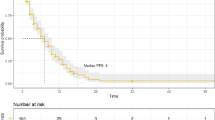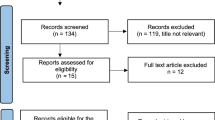Abstract
Purpose
Predictors of response or disease control with oral medroxyprogesterone acetate (MPA) therapy in patients with metastatic or recurrence endometrial cancer remain to be elucidated. The purpose of this study was to clarify the effect of MPA in patients with endometrial cancer and identify markers that predict MPA efficacy.
Methods
We retrospectively analyzed clinical and pathological factors in patients who received MPA. Expression of estrogen receptor, progesterone receptor (PgR), androgen receptor, and Ki67 index was assessed with residual tissue samples of endometrial cancer. Expression levels were evaluated semi-quantitatively using the Allred score. Correlations between expression levels and patients’ characteristics, response to MPA, and survival were assessed.
Results
We analyzed clinical factors in 40 patients and molecular pathological factors in 27 patients for MPA efficacy. The overall response rate was 35% in all 40 patients and there were 10 patients (25%) with continued complete or partial response for over 5 years. However, higher Allred score for PgR (p = 0.050) tended to be and lower Ki67 labeling index (p = 0.001) were significantly predictive factors for long-term complete or partial response over 5 years. Median progression-free survival was 6.4 (2–217) months and the 5-year progression-free survival rate was 32%. Multivariate analysis showed that Allred score ≥3 for PgR (p = 0.039) was the only significant predictive marker for long-term disease control. There were no severe adverse events that resulted in discontinuation of MPA.
Conclusions
This study suggests the utility of MPA when the Allred score for PgR is ≥3. Future prospective studies are needed to confirm these findings.


Similar content being viewed by others
References
Matsuda A, Matsuda T, Shibata A et al (2014) Cancer incidence and incidence rates in Japan in 2008: a study of 25 population-based cancer registries for the Monitoring of Cancer Incidence in Japan (MCIJ) project. Jpn J Clin Oncol 44:388–396
Aoki D (2014) Annual report of Gynecologic Oncology Committee, Japan Society of Obstetrics and Gynecology, 2013. J Obstet Gynaecol Res 40:338–348
Baak JP, Snijders W, van Diermen B, van Diest PJ, Diepenhorst FW, Benraadt J (2003) Prospective multicenter validation confirms the prognostic superiority of the endometrial carcinoma prognostic index in international Federation of gynecology and obstetrics stage 1 and 2 endometrial carcinoma. J Clin Oncol 21:4214–4221
Vance S, Yechieli R, Cogan C, Hanna R, Munkarah A, Elshaikh MA (2012) The prognostic significance of age in surgically staged patients with Type II endometrial carcinoma. Gynecol Oncol 126:16–19
Chung HH, Lee I, Kim HS et al (2013) Prognostic value of preoperative metabolic tumor volume measured by (1)(8)F-FDG PET/CT and MRI in patients with endometrial cancer. Gynecol Oncol 130:446–451
Dai D, Wolf DM, Litman ES, White MJ, Leslie KK (2002) Progesterone inhibits human endometrial cancer cell growth and invasiveness: down-regulation of cellular adhesion molecules through progesterone B receptors. Cancer Res 62:881–886
Dai D, Litman ES, Schonteich E, Leslie KK (2003) Progesterone regulation of activating protein-1 transcriptional activity: a possible mechanism of progesterone inhibition of endometrial cancer cell growth. J Steroid Biochem Mol Biol 87:123–131
Davies S, Dai D, Feldman I, Pickett G, Leslie KK (2004) Identification of a novel mechanism of NF-kappaB inactivation by progesterone through progesterone receptors in Hec50co poorly differentiated endometrial cancer cells: induction of A20 and ABIN-2. Gynecol Oncol 94:463–470
Lentz SS, Brady MF, Major FJ, Reid GC, Soper JT (1996) High-dose megestrol acetate in advanced or recurrent endometrial carcinoma: a Gynecologic Oncology Group Study. J Clin Oncol 14:357–361
Colombo N, Preti E, Landoni F et al (2013) Endometrial cancer: ESMO Clinical Practice Guidelines for diagnosis, treatment and follow-up. Ann Oncol 24(Suppl 6):vi33–vi38
National Comprehensive Cancer Network Clinical Practice Guidelines in Oncology, Uterine Neoplasms, version 2.2016, NCCN.org
Allred DC, Harvey JM, Berardo M, Clark GM (1998) Prognostic and predictive factors in breast cancer by immunohistochemical analysis. Mod Pathol 11:155–168
Harvey JM, Clark GM, Osborne CK, Allred DC (1999) Estrogen receptor status by immunohistochemistry is superior to the ligand-binding assay for predicting response to adjuvant endocrine therapy in breast cancer. J Clin Oncol 17:1474–1481
Mohsin SK, Weiss H, Havighurst T et al (2004) Progesterone receptor by immunohistochemistry and clinical outcome in breast cancer: a validation study. Mod Pathol 17:1545–1554
Phillips T, Murray G, Wakamiya K et al (2007) Development of standard estrogen and progesterone receptor immunohistochemical assays for selection of patients for antihormonal therapy. Appl Immunohistochem Mol Morphol 15:325–331
https://ctep.cancer.gov/protocoldevelopment/docs/recist_guideline.pdf
Japanese translation of common terminology criteria for adverse events (CTCAE), and instructions and guidelines (2004) International J Clin Oncol 9(Suppl 3):1–82
Mortel R, Zaino RJ, Satyaswaroop PG (1990) Designing a schedule of progestin administration in the control of endometrial carcinoma growth in the nude mouse model. Am J Obstet Gynecol 162:928–934
Satyaswaroop PG, Clarke CL, Zaino RJ, Mortel R (1992) Apparent resistance in human endometrial carcinoma during combination treatment with tamoxifen and progestin may result from desensitization following downregulation of tumor progesterone receptor. Cancer Lett 62:107–114
Thigpen JT, Brady MF, Alvarez RD et al (1999) Oral medroxyprogesterone acetate in the treatment of advanced or recurrent endometrial carcinoma: a dose-response study by the Gynecologic Oncology Group. J Clin Oncol 17:1736–1744
Knight WA, Livingston RB, Gregory EJ, McGuire WL (1977) Estrogen receptor as an independent prognostic factor for early recurrence in breast cancer. Cancer Res 37:4669–4671
Clark GM, Osborne CK, McGuire WL (1984) Correlations between estrogen receptor, progesterone receptor, and patient characteristics in human breast cancer. J Clin Oncol 2:1102–1109
Beck T, Weikel W, Brumm C, Wilkens C, Pollow K, Knapstein PG (1994) Immunohistochemical detection of hormone receptors in breast carcinomas (ER-ICA, PgR-ICA): prognostic usefulness and comparison with the biochemical radioactive-ligand-binding assay (DCC). Gynecol Oncol 53:220–227
Zafrani B, Aubriot MH, Mouret E et al (2000) High sensitivity and specificity of immunohistochemistry for the detection of hormone receptors in breast carcinoma: comparison with biochemical determination in a prospective study of 793 cases. Histopathology 37:536–545
Regan MM, Viale G, Mastropasqua MG et al (2006) Re-evaluating adjuvant breast cancer trials: assessing hormone receptor status by immunohistochemical versus extraction assays. J Natl Cancer Inst 98:1571–1581
Dowsett M, Allred C, Knox J et al (2008) Relationship between quantitative estrogen and progesterone receptor expression and human epidermal growth factor receptor 2 (HER-2) status with recurrence in the Arimidex, Tamoxifen, Alone or in Combination trial. J Clin Oncol 26:1059–1065
Thomson CS, Twelves CJ, Mallon EA, Leake RE, Scottish Cancer Trials Breast G, Scottish Cancer Therapy N (2002) Adjuvant ovarian ablation vs CMF chemotherapy in premenopausal breast cancer patients: trial update and impact of immunohistochemical assessment of ER status. Breast 11:419–429
Hammond ME, Hayes DF, Dowsett M et al (2010) American Society of Clinical Oncology/College Of American Pathologists guideline recommendations for immunohistochemical testing of estrogen and progesterone receptors in breast cancer. J Clin Oncol 28:2784–2795
Whitney CW, Brunetto VL, Zaino RJ et al (2004) Phase II study of medroxyprogesterone acetate plus tamoxifen in advanced endometrial carcinoma: a Gynecologic Oncology Group study. Gynecol Oncol 92:4–9
Singh M, Zaino RJ, Filiaci VJ, Leslie KK (2007) Relationship of estrogen and progesterone receptors to clinical outcome in metastatic endometrial carcinoma: a Gynecologic Oncology Group Study. Gynecol Oncol 106:325–333
Ehrlich CE, Young PC, Stehman FB, Sutton GP, Alford WM (1988) Steroid receptors and clinical outcome in patients with adenocarcinoma of the endometrium. Am J Obstet Gynecol 158:796–807
Jongen V, Briet J, de Jong R et al (2009) Expression of estrogen receptor-alpha and -beta and progesterone receptor-A and -B in a large cohort of patients with endometrioid endometrial cancer. Gynecol Oncol 112:537–542
Kobel M, Atenafu EG, Rambau PF et al (2016) Progesterone receptor expression is associated with longer overall survival within high-grade histotypes of endometrial carcinoma: a Canadian high risk endometrial cancer consortium (CHREC) study. Gynecol Oncol 141:559–563
Author information
Authors and Affiliations
Corresponding author
Ethics declarations
Funding
This research was partially supported by a grant from the Practical Research for Innovative Cancer Control program from the Japan Agency for Medical Research and Development (AMED, No.: 15ck0106075h0002).
Conflict of interest
Dr. Tamura (research funding from Kyowa Hakko Kirin, Co.Ltd), Dr. Fujiwara (research funding from Nippon Kayaku, Co. Ltd) and Dr. Shimizu (research funding from Eli Lilly and Company, Pfizer Inc., Chugai Pharmaceutical Co. Ltd.) had conflict of interest and there are no conflicts of interest to declare for others.
Ethical approval
All procedures performed in studies involving human participants were in accordance with the ethical standards of the institutional and/or national research committee and with the 1964 Helsinki declaration and its later amendments or comparable ethical standards.
Electronic supplementary material
Below is the link to the electronic supplementary material.
Rights and permissions
About this article
Cite this article
Yunokawa, M., Yoshida, H., Watanabe, R. et al. Allred score is a promising predictor of prognosis and medroxyprogesterone acetate efficacy in patients with endometrial cancer. Cancer Chemother Pharmacol 80, 127–134 (2017). https://doi.org/10.1007/s00280-017-3342-5
Received:
Accepted:
Published:
Issue Date:
DOI: https://doi.org/10.1007/s00280-017-3342-5




